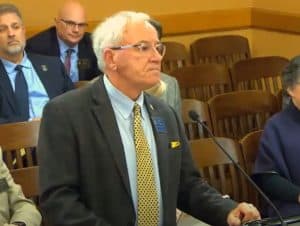Education establishment hostile to accreditation requirement to follow state law
(The Sentinel) – The Kansas education establishment is pushing back hard against a bill that simply requires districts to comply with state law or lose accreditation.
The Kansas House K-12…

(The Sentinel) – The Kansas education establishment is pushing back hard against a bill that simply requires districts to comply with state law or lose accreditation.
The Kansas House K-12 Education Budget Committee heard testimony on February 5, 2024, on House Bill 2612, which would require the Department of Education to strip accreditation from schools that do not comply with all applicable state laws and require school districts to notify parents if accreditation is lost. An audit by the Kansas State Department of Education would be required to regain accreditation.
Additionally, the bill would require KSDE to establish a process to allow any person to challenge a district’s compliance or non-compliance with the law.

Predictably, the committee was flooded with testimony in opposition to the bill. Indeed, of 81 pieces of submitted testimony, 79 were in opposition, one was “neutral,’ and only one — from Mike O’Neal for Kansas Policy Institute, which owns the Sentinel — was in support.
O’Neal said in his testimony that the bill was intended to spark an “open and candid discussion of our current system of school district accreditation.”
“By the reaction it’s received since being scheduled for hearing, it’s having the intended effect,” he said. “If we’re going to have an accreditation requirement that satisfies the intent of the existing statute, we can no longer ignore its failure to stimulate and incentivize improvement in student performance and the quality of instruction.”
KSDE knows districts are not complying with state laws but still grants accreditation
Current accreditation rules require districts to comply with state laws to be accredited, but the Kansas Department of Education knows many districts ignore some laws and still accredits them.
For example:
- The Kansas Department of Legislative Post Audit has now twice documented that audited districts were not targeting at-risk funds in the manner required by law.
- Some districts still use now-debunked literacy instruction after KSDE has directed the use of LETRS (Science of Reading)
- Districts are failing to reallocate resources pursuant to — or even to properly complete — the building-based needs assessment required by law. State law requires school boards to “conduct” needs assessments annually, but many superintendents will not allow board members to participate in any meetings with teachers and principals.
Opponents such as Jim Karleskint of the United School Administrators of Kansas claim that “there is no school or school district in the state of Kansas that is perfect.”
In his written testimony, Karlskint stated, “This bill has the potential of non-accrediting every school district in the state of Kansas. A school district may not be aware of a violation and could lose accreditation over an oversight.”
Karleskint also said that allowing “an individual to challenge whether or not a school district is in compliance of a state law or statute has the potential to allow a displeased patron to create an audit of the district on questionable grounds.”
He also said it was KSDE’s job — not the Legislature’s — to accredit districts.
The Kansas Association of School Boards — in testimony from Assistant Executive Director of Advocacy Leah Fliter — echoed those sentiments, saying, “We support general supervision of public schools under the State Board of Education, including setting standards for accreditation, learning standards, graduation, and licensure. We support management of public schools under locally elected boards of education, including setting curriculum, staffing, financial management, and policies, so that such schools can progress and meet State Board standards.
“HB 2612 appears to conflict with the state constitution’s granting of the ‘general supervision’ of public schools — which includes decisions on accreditation — to the State Board of Education.”
KSDE likewise opposed creating a “private right of action for anyone that does not agree with the State Board’s determination of whether a school district is in compliance with applicable laws,” KSDE members Ann Mah and Dr. Deena Horst wrote.
“The Kansas State Department of Education and the State Board work diligently to address concerns raised by parents, staff members, administrators, and the community. The manner in which those concerns are handled at the state level should not be delegated to non-elected individuals. If the State Board wishes to amend its accreditation regulations to allow for such strong, individual input, it will do so without the demand imposed (by) this bill.”
But as O’Neal points out, the opponents who say it’s KSDE’s job under the state constitution to provide “general oversight” ignore — or deliberately gloss over — that the Kansas Constitution also directed the legislature to create KSDE and provides that the “state board shall perform such other duties as may be required by law,” and therefore KSDE would still be exercising “general oversight” under the law.
“If our school district accreditation law is to have any meaning at all, there needs to be accountability,” O’Neal wrote. “I suspect that the main reason no school district has been unaccredited in modern history is the fear that parents will become concerned with the quality of education their children are getting. Also, no superintendent wants to have to come over to the Legislature to explain why they haven’t met accreditation standards. Districts where student outcomes are declining rather than improving don’t want the stigma of non-accreditation.
“The status of public education in Kansas has reached a crisis point. Improvement will need to be an ‘all hands on deck’ effort. That includes school districts, local boards, teachers, KSDE, SBOE, parents, and the Legislature.”
According to state assessment results, a third of Kansas students are below grade level in reading and math. Also, only 19% of Kansas graduates who took the ACT last year were college-ready in English, Reading, Math, and Science.



